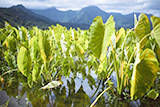LIHUE — The Kauai chapter of the Hawaii Farmers Union United is redoubling sustainable agriculture support with the creation of a new committee aimed at education. “The intention is to show we can prove that the family farmer can still
LIHUE — The Kauai chapter of the Hawaii Farmers Union United is redoubling sustainable agriculture support with the creation of a new committee aimed at education.
“The intention is to show we can prove that the family farmer can still produce profitability in the state using organic and sustainable inputs,” said Ray Maki, president of Kauai’s HFUU chapter.
The Sustainable Agriculture Committee rests on a definition of sustainable that encompasses two things: anything that benefits native ecosystems on Kauai and anything that benefits Native Hawaiians, according to Kauai resident Don Heacock, who instigated the new committee.
“Those are two pieces of natural capitol that you have in Hawaii — it’s unique, you can’t go anywhere else to study Hawaiian culture unless you’re here,” he said. “If something’s sustainable, it’ll preserve that.”
Increasing the amount of information that’s available to the public on sustainable agriculture practices is the main goal. The plan is to accomplish it through education, demonstration and legislation.
“We’ll put together a display that can be sent from island to island, but each island will have the chance to develop their own specific display of sustainable ag on their land,” Heacock said.
That display is the crux of the committee’s education efforts, along with fliers, pamphlets and other educational material that is being developed for distribution.
Photographic displays will demonstrate some of the sustainable agriculture practices that are happening around the state, and give examples of ways to incorporate them into everyday farming.
“Being organic producers, that has a reputation of being less profitable, having more labor and being more expensive,” Maki said. “ We want to show that it can be done.”
Another focus is to address the sustainability of agriculture inputs that can be created in the state and in many cases, onsite.
“The cost of those inputs is one of the biggest limiting factors,” Maki said.
Educating lawmakers and affecting legislative action is also on the agenda for the committee, as is networking with other organizations to learn new information in the realm of sustainable ag.
Promoting crops like taro and practices like aquaponics is on the list of goals.
“People don’t know what sustainable ag is; I found 27 definitions in peer reviewed publications, and sustainable agriculture (is) essential if mankind is going to survive and thrive with a meaningful and enjoyable quality of life,” Heacock said.


